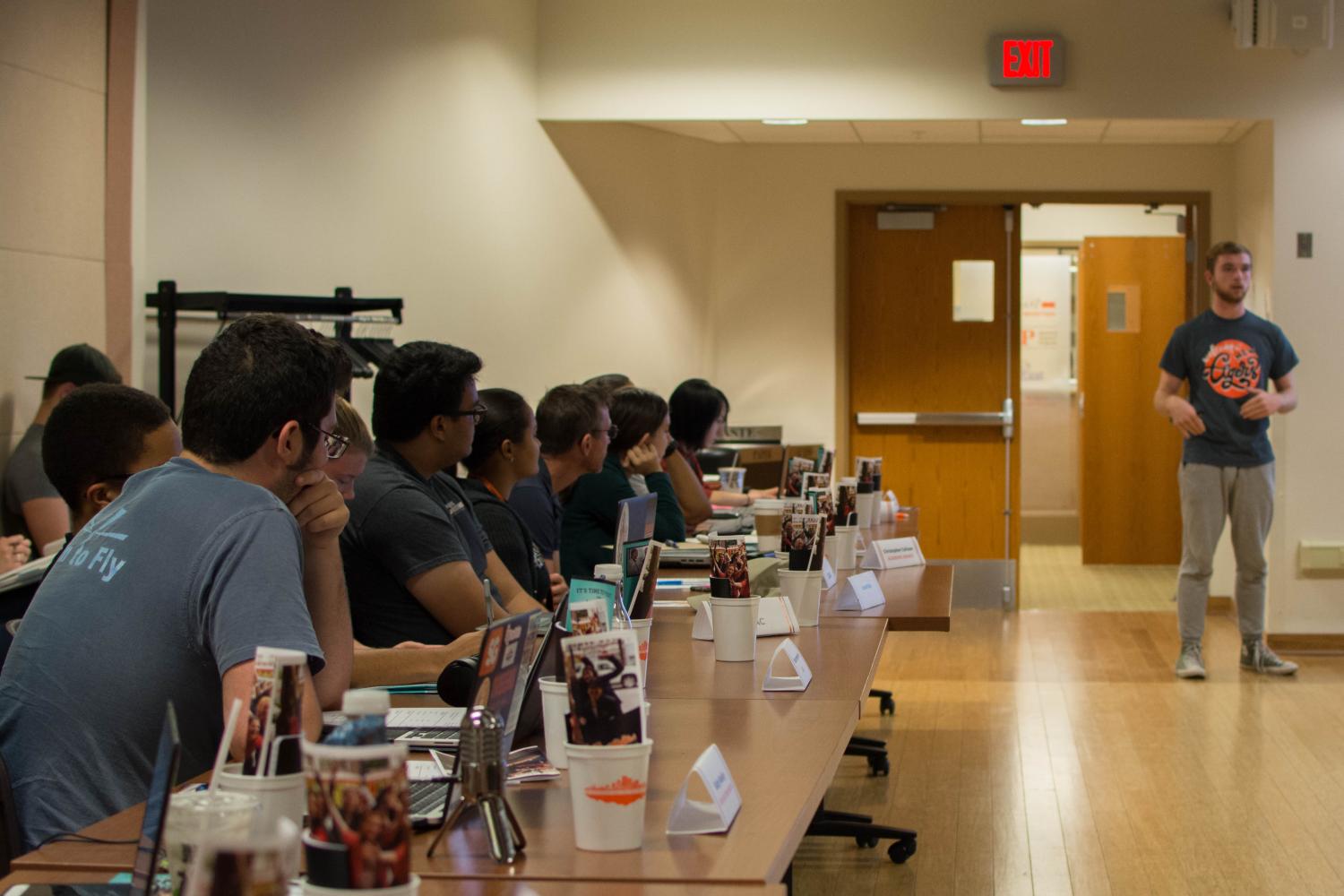The RIT Triumvirate
by Taylor Derrisaw | published Nov. 4th, 2016
Before you have even set foot on RIT property, a series of events, meetings, late nights and a menagerie of emails have helped create a welcoming, student-driven, open environment for you. An institution as large as RIT requires more teamwork and planning than most businesses do over their lifetime, and the institution spends a respectable amount of time ensuring policies are up to date, the curriculum is responsive to real world changes and that students and faculty operate in a learning conducive environment.
It can be easy for some RIT students to dismiss or be unaware of the decision-making process at RIT, but it’s important to understand how decisions are made and how similar individuals with different constituents interact with one another to make RIT the successful institution it is today.
At RIT there are three governance groups: Student Government (SG), Academic Senate and Staff Council. Each of the governance groups interacts with the others regularly. For example, SG has a member of Academic Senate who sits in during its meetings. They also have a member of the Board of Trustees who sits in during the meetings as well — but more on the Board later.
Student Government
SG is probably the most recognizable governance group on campus, as all of its members are student-elected representatives. Accordingly, a lot of the issues that the group focuses on involve student-related issues. SG meets multiple times throughout the week to discuss planning, committees and various other issues. They also have a weekly open meeting every Friday from 2 to 4 p.m. in the Bamboo Room.
Their main route of student input is through PawPrints, an online program that started in 2014 with the goal of allowing students the opportunity to have their voices heard by SG.
Any student with an RIT account can log in and either create or sign petitions. Petitions can cover many topics, from petitioning administration to flying the Black Lives Matter flag to getting Wi-Fi in outdoor spaces. Once a petition has reached 200 signatures, the writer and signers of the petition are guaranteed a response by SG. However, a petition doesn’t necessarily need to reach 200 signatures in order to receive a response.
“Sometimes [petitions] that don’t have 200, we’ll still respond because they’re still important, or maybe it’s a smaller constituent group,” current SG president and fourth year Graphic Design major Andrea Shaver said.
Shaver and current vice president and fifth year Computer Engineering student Amar Bhatt are both heavily involved in the petition process. Although they don’t directly oversee each and every petition that goes up, they are responsible for guiding both senators and cabinet members in achieving their goals.
“My
After SG decides whether or not to pursue the petition, a charge will be created. This is when the senate is informed about the petition, what it entails and what its overarching goals are. From there, it will be assigned by the senate to a specific senator, committee or Major Student Organization (MSO).
In order to facilitate each petition's goals, SG has a series of committees that all handle specific petitions. For instance, the Deaf Advocacy Committee handles matters that are important to the Deaf community. In this case, many of the things the committee tackles involve concerns about accessibility. Another example is the Technology Committee, which handles charges related to technological improvements around campus, such as the outdoor Wi-Fi petition. These committees will then work with administration to develop a plan for implementation. Sometimes petitions are unfeasible, in which case they will be dropped.
In order to facilitate communication with the other governance groups, Shaver sits in on the Academic Senate to make sure student voices are represented.
Academic Senate
Academic Senate consists of multiple departments that aid different constituents — namely faculty — but students are represented by the president of SG. As their names suggest, the student side of Academic Senate focuses on policies that will mainly affect students, while the faculty side focuses on changes and policies that affect the staff of the university.
“The Academic Senate is the governance group that represents mostly the faculty ... although the university is taking a very liberal perspective in being inclusive with other players who matter to the academic mission of the university,” Provost and Senior Vice President for Academic Affairs Jeremy Haefner said.
Additionally, the senate is divided into a series of committees and subcommittees, much in the same way that SG is. As with SG, different committees handle different matters. For example, the Student Affairs Committee of Academic Senate is currently working on developing a paper that will highlight how to best encourage consistent grading practices.
Most issues that appear before the Academic Senate include things that apply to the curriculum at RIT. All new academic programs must come through Academic Senate. The provost will then make recommendations to the president, who then makes the final decision.
“The senate is a recommending body; ultimately they just make recommendations. The understanding is that the president and I don’t interfere with that process,” Haefner said.
Staff Council
As SG focuses on student issues and the Academic Senate focuses on curriculum revisions, the Staff Council’s responsibilities include policy revisions and recommendations. The council is organized in the same manner as SG and Academic Senate, with committees handling a variety of issues.
According to their website, “Staff Council is an advisory body to the president ... on issues and decisions that impact Rochester Institute of Technology.”
In recent years, the council has worked with the other governance groups to pass a number of resolutions. A few examples include the new smoking policy as well as the formation of the Pedestrian Safety Task Force. In order to tackle concerns like these, the council's website has a suggestion system where any member of the RIT community can submit new ideas. Anyone who submits has a chance of winning a $25 RIT Dining gift card.
It may not be obvious from the outside, but a lot of work goes into ensuring that students and faculty have a healthy, organized and welcoming community at RIT. From new policies to an expansion of the curriculum or funding for new recreational activities, the three governance bodies do their best to make RIT the best.




